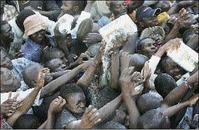
Kenyans scramble for maize as the Kenyan Red Cross distributes food, yesterday in the Mathare slum in Nairobi. Kenyans prayed Sunday for peace and an end to a political deadlock that sparked a week of deadly riots, while the opposition rejected an offer from the president to form a unity government. - AP
KACHIBORA, Kenya (AP):
Armed with bows and arrows and automatic weapons, hundreds of attackers poured through the camp where the terrified had sought refuge yesterday. They fired into the air, sparking a brief gun battle with police before fleeing into the hills.
Hours later, after the bodies of a woman and her baby shot dead were carted away, aid agencies arrived to hand out emergency sacks of food to the hungry masses.
It sounds like a scene from war-ravaged Congo or Sudan. But this is Kenya, a country long known for welcoming refugees from troubled neighbours not producing them.
A week of postelection violence has left at least 250,000 people homeless, shattering the East African country's image as a haven for those fleeing conflict.
Refugees
"I can't believe it. We're refugees in our own land," said Dan Mugambi, a 35-year-old teacher who was among about 15,000 people sheltering in a primary school compound in the North Rift Valley village of Kachibora. "This has never happened here before."
Though violence around the country has eased over the last few days, Kenya is still reeling from unrest unleashed after supporters of opposition leader Raila Odinga accused President Mwai Kibaki of rigging the December 27 vote. The charges brought long-hidden ethnic tensions to the fore, sparking mayhem in the slums of the capital, the coast and the countryside.
Mugambi said violence here began on New Year's Eve, when crowds of ethnic Kalenjin youths armed with machetes and spears descended on his village, Geta Farm, about six miles (10 kilometers) north of Kachibora. They burned the homes of Kisii tribesmen, he said, many of whom backed Kibaki in the poll.
Mugambi fled with his family and took refuge in Kachibora's Noigama Primary School, attracted by the small police station next door that he and others thought would keep them secure. It was quiet at the school until yesterday, with the arrival of hundreds of Kalenjin armed with machetes, bows and arrows and rifles. After about 45 minutes, the attackers were repulsed by police. The corpse of a woman, a bloody bullet wound in her chest, lay face up under a blanket beside a tree. The body of her baby had already been taken away.
Unprecedented
District police commissioner Iad Matata said the attackers were cattle raiders who tried unsuccessfully to steal the displaced villagers' animals. But a dozen people at the camp and a human rights worker said the assault was unprecedented. Cattle raiders, though active in the region, typically launch small attacks on single farms - and rarely with a force numbering in the hundreds.
Mugambi said the attackers' aim was to harass.
''They want us to move away,'' Mugambi said, adding that during every presidential poll since 1992 _ the dawn of multiparty democracy in Kenya _ ''there have been tensions here.'' Kalenjin youths left anonymous fliers in villages during past votes "telling us to leave," he said. "They didn't this time, but now they're following through."
Many people brought with them only mattresses and sacks of maize. They wear only the clothes on their backs. They sleep under the stars on a grassy field, and cook in the open with metal pots over smoky fires.

